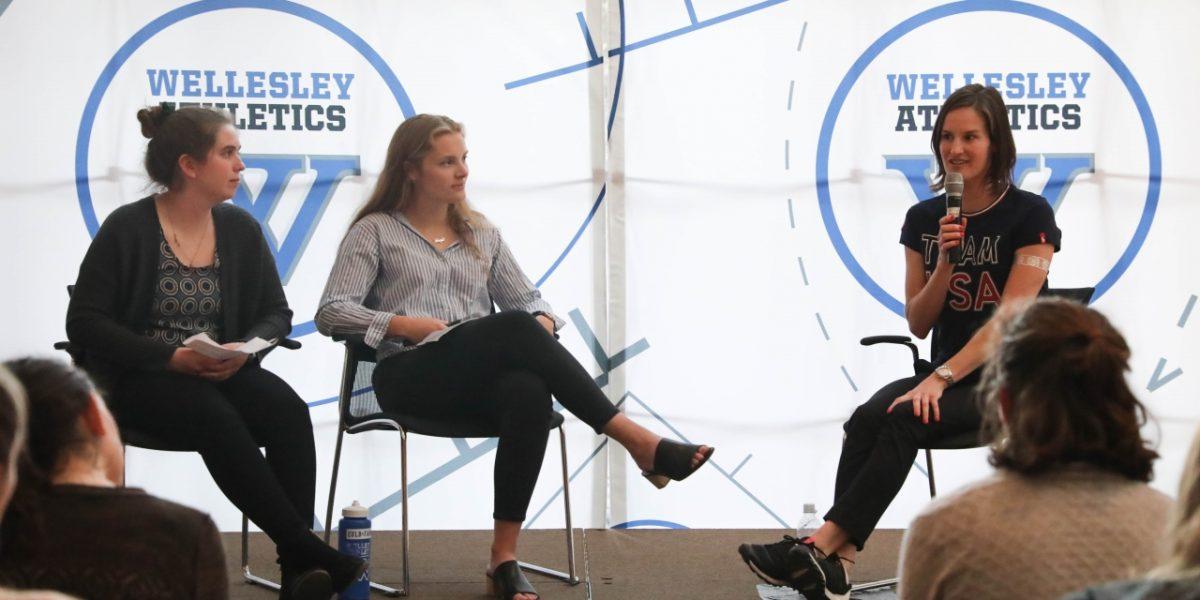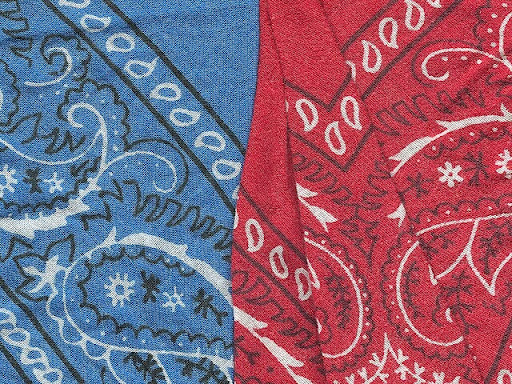On Monday, April 23, Clare Egan ’10 returned to Wellesley to discuss her journey from college undergrad to Olympic biathlete who competed for Team USA in the 2018 Winter Olympic Games in PyeongChang, South Korea.
Moderated by Olivia Holbrook ’20 and Faye Washburn ’20, the event was held in Tishman Commons in the Lulu Chow Wang Campus Center and was organized by Wellesley Athletics and Recreation. It was attended primarily by current Wellesley athletes who found Egan’s words to be inspiring and her life a testament to how driven and dedicated Wellesley students are. “It’s like watching Hillary give a speech,” said field hockey player Julia Ellman ’21. “We all tuned in to watch [Egan] compete and felt a sense of real school pride.”
The Biathlon is a combination of cross-country skiing and shooting with a .22 caliber rifle. It originated in the snowy forests of Scandinavia when people hunted for food on skis with rifles slung over their shoulders. This practice evolved from a necessary survival skill to an organized military patrol to the standardized Olympic sport that we watch today. Though the biathlon is among the most-watched sports in Europe, in America, it remains an exotic enigma often known only to those who participate. Such was the case for Egan.
During her time at Wellesley, Egan ran for the cross country and track team and founded the Wellesley Nordic Ski club team. She claimed laurels in each sport. She was Wellesley’s first ever outdoor track and field All-American, finishing sixth nationally in the 1500m at the 2010 NCAA Division III Championships. Egan remains the only runner in Wellesley cross country history to claim New England Women’s & Men’s Athletic Conference (NEWMAC) Runner of the Year, Rookie of the Year and Seven Sisters Championship individual champion honors in the same season (2006) and the first athlete to represent Wellesley in the NCAA Nordic skiing Championships.
When asked about her time at Wellesley, Egan remarked, “I definitely appreciate Wellesley more the father I get away from it,” citing that it was challenging for her both academically and socially. One of the most notable lessons she learned while competing at Wellesley was “to try my best and then […] be satisfied.” She internalized this idea and kept with her in every race, whether running or skiing. Egan learned she must let go of how other people were performing and focus solely on herself and her own process, a mantra that became paramount when she began learning to shoot.
The Wellesley environment also fostered Egan’s passion for standing up for women and women’s rights, especially in professional sports. She noted that the ratio of men to women in the biathlon is at least 100:1, and “I am often in a room when it’s me and 12 men […] Wellesley taught me to be confident as a woman and opened my eyes to the differences in not only biathlon, but in other sports as well.”
After traveling abroad for a year when she was a junior at Wellesley, she decided to use her last year of NCAA eligibility to compete at the Division I level as a member of the University of New Hampshire Nordic ski team. She was then accepted into the Craftsbury Green Racing Project, a post-collegiate team based in Vermont that was founded by two former Olympians and specialized in transitioning elite college athletes to the U.S. national team.
Training for the national team was a full-time commitment. She said she and the other athletes would train twice a day six days a week, hiking and roller skiing, an off-snow equivalent to cross-country skiing, for several hours in the morning and then again for one to two hours in the afternoon. She found that the “only thing that is holding you back is how much you can train and the quality of that” and subsequently spent much of her time striking a balance between rest and training, a concept that was previously unfamiliar to her. Even when competing on the Craftsbury team for cross-country skiing, she still did not have her sights set on the Olympics and often said to herself “maybe I can get on the national team or ski a world cup at some point.”
After competing with Craftsbury for two years, Egan was introduced to biathlon by a former Olympic gold medalist and national team coach. She was offered lessons with another Olympic gold medalist and remarked that “When an Olympic gold medalist offers to teach you a lesson, you just say yes.”
She then started focusing on biathlon and was brought into the U.S. biathlon development team. From there, she eventually joined the national team, where she competed for three years. After being the second alternate to the 2014 Olympic team, she realized that qualifying for the Games was definitely within reach in 2018. She explained that she learned that, “I should have believed in this goal earlier, then I might have made the 2014 team, […] I should let myself believe in goals that are scary, it’s okay to do that.”
She told the audience that the actual moment when she qualified for the 2018 Olympics was far less ideal than the NBC fanfare she had imagined. She qualified with the second best result out of the American team in the World Cups before Christmas, but leading up to it, she was hoping that no one else in her team would outperform her.
Regardless, Egan decided to simply try to win first place in her race. The actual race, however, went poorly, as she finished 89th out of 95 competitors and ultimately made the team because her teammate had done worse than her. She noted that, “It was a good reminder that the Olympics wouldn’t be this video montage from NBC; I needed to clear that out and focus on my own performance.”
Regarding her performance, she spoke to the extreme cold and wind that she faced and for which she felt better equipped than athletes who trained in less extreme conditions. She took the words of a high school coach to heart, who told her that she should not get distracted by the bad weather, as those around her might, but should instead take that day and make it her own. She also spoke about the pressure of competing at such a high level, describing her job as one with high rewards and major challenges, where she might be celebrated or feel like she has let a nation’s worth of supporters down. Although her pre-race rituals include shaking her lucky brass pigs and visualizing various scenarios, she also stressed the importance of training, eating and recovering well.
Apart from competing, Egan described one of her favorite moments to the audience, which was when she got to see the women’s’ team sprint, a cross country skiing event, from a hill in her training course. She witnessed the American women’s team win their first gold medal in over 30 years. Another highlight included a brief conversation with former UN Secretary General, Ban Ki-moon, in the athlete dining hall, thanks to Korean lessons over Skype with Wellesley Professor Seok Bae Jang.
Egan currently lives in Lake Placid, New York, where the national team is based. When asked about her future plans, she admitted that she is still deciding between competing in biathlon for another year or retiring from the sport. She hopes to make her decision relatively soon, since she’ll be meeting with the new coaching staff next week. Regardless, she does not plan to strive for the 2022 Olympic team but enjoys the prospect of being on the national team and continuing to represent the United States.




